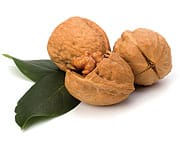Life Extension Magazine®
More than ever before, researchers are convinced about the nutritional benefits of walnuts. Each walnut you crack open and eat contains loads of vitamins, phenolic acids, tannins, and flavonoids, as well as those hard-to-find omega-3 fatty acids, with almost 90% of the phenols being found in the skin. This array of compounds contributes to heart health, works to prevent cancer, helps fight diabetes, improves cognitive function, and may even help with a better night’s sleep. While many nuts have proven to be extremely beneficial to your health, studies are showing that eating a handful of walnuts contains almost twice as many antioxidants as an equivalent amount of any other commonly consumed nut. Over the course of this article, we’ll demonstrate through scientific studies how adding a few handfuls of walnuts to your daily diet can greatly improve your health. “Eating a handful of walnuts contains almost twice as many antioxidants as an equivalent amount of any other commonly consumed nut.” History
Walnuts are the edible seeds of any tree among the genus Juglans. Walnut trees have been cultivated for thousands of years, with the three main species consisting of the English (or Persian) walnut, the black walnut, and the white walnut. The English walnut is the most widely consumed type of walnut in the United States. It originated in India and the regions surrounding the Caspian Sea. Ancient Romans introduced the walnut to many European countries, where in turn they were brought to North America via English merchant ships, hence earning the moniker, “English walnuts.” Presently, China is the largest producer of walnuts in the world, with the United States following close behind.1 BenefitsCognitive FunctionThe Doctrine of Signatures is an old-fashioned philosophy that states that a food’s appearance can tell us what part of the body its nutrients are good for. While this is more of an old wives’ tale in many instances, in the case of the walnut, it holds some water. For instance, a cracked whole walnut looks much like the human brain, and it so happens that walnuts can be used to treat brain injuries and enhance cognitive function, which is why it’s referred to as a “brain food.”2 The reason they are so good for your brain health is the high concentration of omega-3 fatty acids. Your brain consists of more than 60% structural fat, and for the brain cells to function properly, omega-3 fats need to be a primary component. The American diet is almost devoid of all omega-3s, with researchers finding that about two-thirds of Americans are deficient in omega-3 fatty acids. A study done at Purdue University has shown that children with a lower concentration of omega-3 fatty acids have a higher risk of being hyperactive, having learning disorders, and displaying behavioral problems.3 There have been hundreds of scientific studies signifying a variety of problems linked to omega-3 deficiencies.
Cardiovascular BenefitsThe most in-depth aspect of walnut nutritional research has been the benefits for the heart and circulatory system. They have had a very favorable impact on vascular reactivity, which is the ability of our blood vessels to respond to stimuli in a healthy way.1 Walnuts contain high amounts of alpha-linolenic acid, or ALA, which is a major contributor to heart health by thinning the blood; reducing risks of clots or heart attacks.4 A study in the American Journal of Clinical Nutrition reviewed the heart health benefits of walnuts on 365 participants, who were monitored during control diets and diets supplemented with walnuts. Results showed a significantly greater decrease in total cholesterol and low-density lipoprotein (LDL).5 In a study conducted at the Lipid Clinic in Barcelona, Spain, 21 men and women with high cholesterol were given a regular low-calorie diet or one where one-third of the monounsaturated fats were replaced with walnuts. After 4 weeks, the participants switched to the other diet. Along with the reduced levels of cholesterol, the walnuts were found to increase the elasticity of the arteries by 64% and to reduce levels of vascular cell adhesion, a key player in the development of atherosclerosis, or the hardening of arteries.5 Anti-Cancer Benefits
Seeing that there are such high amounts of antioxidants and nutrients found in walnuts, it’s no surprise that research has shown that eating walnuts can help against cancer. A form of vitamin E called gamma-tocopherol, found in high abundance in walnuts, has been found to help fight breast, prostate, and lung cancer.6 Also, walnuts reduce the levels of endothelin, a compound that increases blood vessel inflammation. Men with prostate cancer are known to have higher levels of endothelin, prompting further research into the relationship between walnuts and prostate cancer. A recent study at the University of California-Davis examined the effects of walnuts on prostate cancer in mice. Scientists fed a diet of walnuts to mice with prostate cancer, and after 18 weeks they found that the mice who consumed a human equivalent of 2.4 ounces a day had much smaller, slower-growing tumors, reducing cancer growth by 40%.7 The omega-3 fatty acids along with phytosterols in walnuts have been proven to help curb breast cancer tumor growth. According to researcher W. Elaine Hardman, PhD, from the Marshall University of Medicine, “Phytosterols bind to estrogen receptors, so they would be expected to slow the growth of breast cancers.” In a study done by Hardman, one group of mice was fed a daily diet that included the equivalent of 2 ounces of walnuts in humans, while another group was fed a regular diet. The mice that ate the walnuts had a much lower incidence of breast tumors, slowing the growth by half.8 DiabetesConsumption of walnuts has increasingly been found to help people with type 2 diabetes. Studies have shown that daily walnut intake provides significant benefits in different measurements of blood vessel functioning. A study at Yale University took 24 adults with type 2 diabetes and had each consume 2 ounces of walnuts to go along with their regular diet. After 8 weeks, blood flow and endothelial function, which is a powerful predictor of cardiovascular risk, significantly improved.9
Protecting Bone HealthAlpha-linolenic acid (ALA) is the omega-3 fat found in walnuts, and it has demonstrated a remarkable ability to promote bone health. In a study done by researchers at Penn State University, 23 participants were fed 4 different diets over 6-week periods, one of which was a high-ALA diet. After each segment of the study, the subjects were tested for levels of N-telopeptides, a marker of bone breakdown. Findings showed that in the diet consisting of high levels of ALA, the N-telopeptides count was much lower.10 Weight ManagementDespite the variety of health benefits walnuts seem to offer, many people stay clear of them due to a fear of gaining weight. In fact, studies have shown that those fears are groundless and eating walnuts actually help as a great tool for weight management. In 2001, Loma Linda University conducted a study which found that regular walnut consumption did not lead to weight gain amongst their participants. The study consisted of 10 men who suffered from high cholesterol. Over a six week period, the men whose diets included walnuts showed a 6% decrease in LDL cholesterol.11 Caution: While walnuts provide documented health benefits, they are very high in calories. This means you should incorporate walnuts into your normal meals and not use them as snacks. If one intentionally eats walnuts in the form of excess calories, it could sabotage a weight management program. The best way to benefit from walnuts is to substitute them for other calories so your total daily calorie intake is not increased. If you have any questions on the scientific content of this article, please call a Life Extension® Health Advisor at | |||||||
| References | |||||||
| 1. Available at: http://www.whfoods.com/genpagephp?tname=foodspice&dbid=99. Accessed May 12, 2011. Accessed May 23, 2011 2. Wood R. The New Whole Foods Encyclopedia. Penguin (Non-classics); 1999 3. Available at: http://walnutsweb.com/walnuts/Health+Benefits+of+Walnuts. Accessed May 14, 2011. 4. Pratt S, Matthews K. SuperFoods HealthStyle: Simple Changes to Get the Most Out of Life for the Rest of Your Life. Harper Paperbacks; 2006. 5. Banel DK, Hu FB. Effects of walnut consumption on blood lipids and other cardiovascular risk factors: a meta-analysis and systematic review. Am J Clin Nutr. 2009 Jul;90(1):56-63. 6. Grotto D. 101 Foods That Could Save Your Life. New York: Bantam Bell; 2008. 7. Available at: http://health.universityofcalifornia.edu/2010/03/22/walnuts-prostate-cancer/. Accessed May 14, 2011. 8. Hardman WE, Ion G. Suppression of implanted MDA-MB 231 human breast cancer growth in nude mice by dietary walnut. Nutr Cancer. 2008;60(5):666-74. 9. Ma Y, Njike VY, Millet J, et al. Effects of walnut consumption on endothelial function in type 2 diabetic subjects: a randomized controlled crossover trial. Diabetes Care. 2010 Feb;33(2):227-32. 10. Available at: http://www.medicalnewstoday.com/releases/63469.php. Accessed May 14, 2011. 11. Muñoz S, Merlos M, Zambón D, et al. Walnut-enriched diet increases the association of LDL from hypercholesterolemic men with human HepG2 cells.J Lipid Res. 2001 Dec;42(12):2069-76. 12. Available at: http://www.nutsforalmonds.com/nutrition.htm. Accessed May 20, 2011. 13. Available at: http://www.ilovepecans.org/nutrition.html. Accessed May 20, 2011. 14. Available at: http://www.hazelnutcouncil.org/health/nutritious.cfm. Accessed: May 19, 2011. 15. Available at: http://www.pistachiohealth.com/. Accessed: May 19, 2011. |






